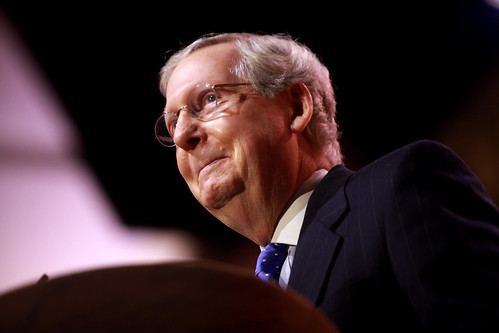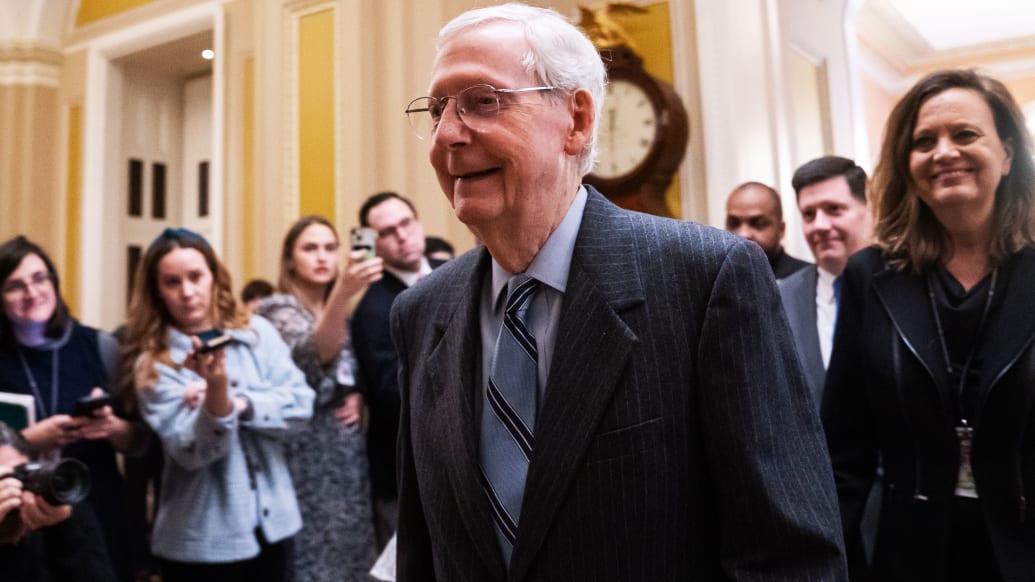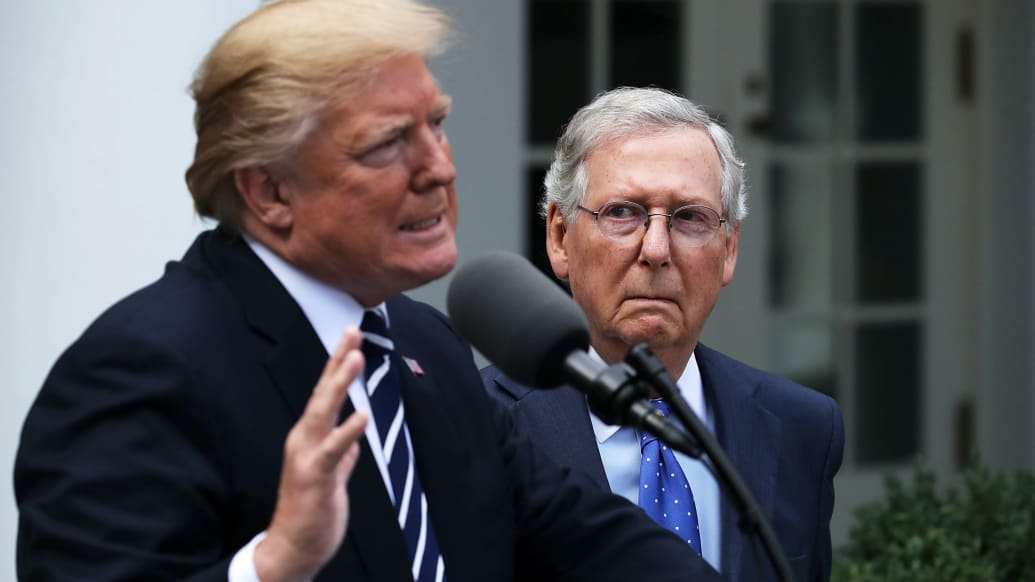Mitch McConnell Could Have Been One of the Greats, but Trump Beat Him
Mitch McConnell #MitchMcConnell

“One of life’s most underappreciated talents is to know when it’s time to move on to life’s next chapter,” Sen. Minority Leader Mitch McConnell declared from the Senate floor on Wednesday. “So I stand before you today… to say that this will be my last term as Republican leader of the Senate.”
Indeed, a good lesson in life is to leave them wanting more. But aside from Jerry Seinfeld, who ended his hit show, Seinfeld, while it was still wildly popular, it’s difficult to conjure too many examples of men who went out on top—of their own volition.
Knowing when to say when is, indeed, an underappreciated talent. Sadly, for McConnell, he missed his window. He’s past his prime, the game has passed him by. And this is not merely because he has suffered health problems in the last year, or so. Donald Trump and the young MAGA bucks in the Senate were already on their way to supplanting McConnell, and rendering him politically impotent.
To be sure, he’s not going into hiding. McConnell plans to finish his term (which ends in Jan. 2027) in the Senate, and he’ll still be the Minority Leader until November. But, like former Speaker Nancy Pelosi, his congressional career will not end with him leading his caucus. It’s the end of an era.
In his memoir, The Long Game, McConnell writes that his parents taught him “the only way to fail in America was to quit or die.” As he quits his leadership post, it is perhaps appropriate to ask whether he succeeded or failed.
So what shall we say of his tenure? If the test of leadership is whether you leave the institution better than when you found it, then McConnell does not leave on a high note. Indeed, whether you’re talking about defending Ukraine (a McConnell priority) or the presumptive third nomination of Donald Trump as the GOP standard bearer (something McConnell would surely prefer not to see), McConnell finds himself out of step with the GOP’s zeitgeist.
This is a common lament for us Reagan conservatives. But as the Republican leader of the Senate (and the longest-serving Senate leader in history), this happened on his watch.
It’s worth asking how many of the things McConnell truly cared about are in better shape than when he assumed leadership.
As a child, he overcame polio, only to see many in his party radicalize against COVID-19 vaccinations.
Senate Minority Leader Mitch McConnell (R-KY) walks into the Senate chamber on Feb. 28, 2024 in Washington, D.C.
Nathan Howard / Getty
As a young Republican, he was ahead of the curve on civil rights, only to see his party continue to back a man many consider to be a racist.
Two decades ago, McConnell was the lead opponent against the Bipartisan Campaign Reform Act (a.k.a. McCain-Feingold)—a well-meaning, if ill-considered, campaign finance reform legislation that had the unintended consequence of destroying political parties and, ultimately, giving us Donald Trump. It was signed into law by President George W. Bush, a Republican.
Just one decade ago, then-Sen. Majority Leader McConnell beat back against the radicals in his party, keeping them from squandering winnable seats. Today, the fight is over—and the bad guys won.
Perhaps a younger, healthier McConnell could have stood up to MAGA. (Remember in The Godfather, after the attempted hit on Vito Corleone, when Virgil Sollozzo asks the family’s consigliere Tom Hagen, “Ten years ago, could I have gotten to him?” The unspoken answer was… probably not!) This counterfactual is hard to prove.
That’s not to say McConnell wasn’t a consequential figure, or that he didn’t put points on the board. By engaging in some admittedly hardball tactics (such as refusing to hold hearings for Merrick Garland’s Supreme Court nomination), McConnell is arguably more responsible than any other conservative for confirming justices that would ultimately overturn Roe v. Wade.
If you are a pro-life conservative, as I am, you view overturning Roe as the culmination of nearly 50-years’ worth of work. In a sane world, that puts him in political Cooperstown. But I have a feeling he wouldn’t end up in a conservative hall of fame if the votes were cast today, at least.
Despite this major achievement, McConnell—like Rodney Dangerfield—gets no respect. Ironically, today, his own political party generally considers him a RINO establishment type.
But none of these things are what we might consider to be his defining moment.
The two most significant things McConnell has done arguably both happened on the same ignominious day: I consider his impeachment trial speech to be the greatest thing he ever did, and his impeachment trial vote to be the worst thing he ever did.
Donald Trump and Mitch McConnell talk to reporters at the White House on Oct. 16, 2017.
Chip Somodevilla / Getty
The speech, which came after his vote, was blistering: “There is no question that President Trump is practically and morally responsible for provoking the events of that day,” McConnell said. “The people who stormed this building believed they were acting on the wishes and instructions of their president.”
But McConnell’s vote (presumably, based on post-hoc rationalizations having to do with whether you could convict someone who was no longer serving as president) belied the seriousness of his comments.
It’s unclear whether McConnell could have mustered enough Senate Republican votes to convict Trump (thereby rendering him ineligible to serve as president in the future) had he earnestly tried. But the fact that he did not try is, in itself, an indictment.
Maybe he wasn’t quite considered the “Master of the Senate” like Lyndon Johnson, but McConnell was widely respected as a canny operator and a shrewd player at the game of inside politics. Perhaps he thought that he was being strategic by not finishing Trump off—that Trump was finished anyway, and that this was the smart, Machiavellian, move that would redound to McConnell’s benefit.
It didn’t work out that way. By failing to finish him off, Trump came back, and it is Trump’s party now.
At the end of the day, this was McConnell’s defining moment. And he didn’t just swing at the ball and whiff in the bottom of the ninth with the bases loaded; he struck out looking—with the Louisville slugger on his shoulders.
When I interviewed him in 2016 about his memoir, McConnell talked with me about formative events in his life. One of those events involved standing up to a bully who harassed him as a child. At his father’s insistence, a young McConnell “took him down” and “bent his glasses,” earning the bully’s respect.
It would be wrong to say that Mitch McConnell never stood up to Trump; he did. Sadly, though, McConnell was unable or unwilling to kick this bully when he was down. And, at the end of the day, that is his saddest legacy.

